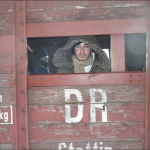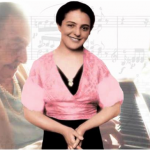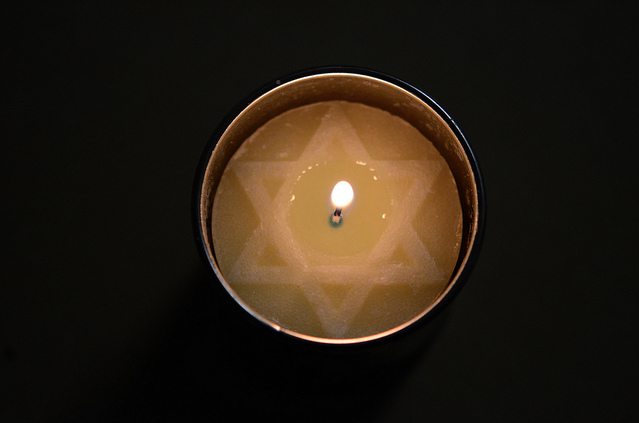An Encounter with the Past:

After high school, I spent a year studying at a yeshiva in Israel. During one of the breaks I joined some of my peers on an organized trip to Poland, called Shorashim. Shorashim is the Hebrew word for “roots,” and this name encapsulates the goal of the trip. We learned about the Holocaust and visited relevant sites, but we also learned about the rich history of Jews in the region, which lasted over 400 years.
The trip organizers gave us all a small notebook and encouraged us to write in it. I have always been afraid of the “solidity” of words, and was hesitant to follow their advice. I did it anyway, but after a few days I gave up. I felt that my words did not do justice to my feelings, and my feelings did not do justice to the events I was trying to understand. I closed the notebook, and have not opened it since.
When I was assigned the task of writing this article, my initial instinct was to reject it. I don’t know how to write, and to have my first writing assignment on staff to be about the Holocaust is a tall order! It was mostly because my initial reaction was so strongly against the assignment that I decided maybe the best thing for me to do is to accept it.
I’m not sure exactly what my assignment was. But I know it involved Yom Hashoah – Holocaust Remembrance Day – and an Oscar award-winning short documentary entitled The Lady in Number 6. The film was screened at Hillel and co-hosted by the Center for Jewish Studies Student Leadership Council and Bearing Witness. Following the screening, Jasmine Daghighian, one of the producers, answered questions. Some of her answers are included in the following segment of my article.
The Optimistic Survivors in Apartment Number 6:

In 2002, Malcolm Clarke released the film ‘Prisoner of Paradise’ which tells the true story of Kurt Gerron, a Jewish film director who was forced to make a Nazi propaganda film. In doing so, he made a name for himself as a man who could make a great Holocaust documentary, and so people kept asking him to “do it again.” Given the emotional fatigue resulting from watching Holocaust archival footage every day for two years straight, he had decided that he would not go near the Holocaust again. Thanks to the coaxing of a friend, this decision would be revoked once he met with Alice Sommer.
Alice, who recently passed away at the age of 110, was the oldest Holocaust survivor alive at the time. She was also by far the most optimistic survivor Clarke had met. He had never heard a perspective like hers, and became determined to capture her amazing personality on film. Given her advanced age, he knew that time was not on his side, so he skipped the funding step of making a movie. Instead he put together a crew of people who were committed to the movie and were willing to hold off on payment. He shot interviews with her and two of her friends over the course of two weeks in her apartment – number 6 – in England.
Those two weeks were distilled to 40 minutes, but only after four years of editing. It took so long to edit because there was not a clearly defined agenda of the movie. Some wanted it to focus on Alice’s experiences during the Holocaust, some on the fact that her musical talents saved her, and some wanted it to simply be about the present-day Alice. Perhaps the reason the final product is short is that there isn’t enough time for the movie to define which of these it is, and instead it is all three.
The movie is so masterfully woven that it is difficult to pick out one of the three strands without unraveling it entirely. Thankfully, there is an aid in doing so in that the two friends who are interviewed in the movie may be seen not only as fill-ins to give context to Alice’s story, but also each seems to loosely represent one of the aforementioned messages. Each was raised in a certain way such that when faced with the tragedies of the Holocaust, they focused on different aspects of it, reinforcing their initial mindset. While the particulars are unique, the common factor of all three is their powerful optimism. It is difficult to define optimism, but you know it when you see it. And when you watch this movie you see a lot of it.
Alice’s friend Zdenka Fantlova was an actress and met Alice in the Theresienstadt concentration camp. One of the stories she recounts is of her father, who, as he is being carried away by the Nazis says “calmness is strength.” This motto, and the fact that she is an actress, summarizes Zdenka’s attitude towards life. Like an actor on stage, she is merely an observer, one who happened to have been around at a certain time and place which resulted in her witnessing atrocities during the Holocaust, and other events after surviving it. This attitude is closest to the typical Holocaust documentary, one which is optimistic only to the extent that it is fatalistic.
Alice’s other friend, Anita Lasker-Wallfisch, is a cellist who survived Auschwitz thanks to her musical talents. Anita tells about her father’s instruction to fill her mind as much as possible, because no one can take away what is in your mind. To her, music is something to fill one’s mind with, so that no matter what you are facing, you can escape into your imaginary world in your head. When Dr. Mengelev came into the music hall to ask for a particular song, she played it and controlled herself from imagining what he had just been doing before he came. This form of optimism, like Zdenka’s, is closely linked to a sense of fatalism; the world may be utterly terrible, but it is the power of music and the imagination which enables one to transcend.
Alice’s optimism differs from her friends in that there isn’t a shred of negativity in it. To her, “music is a dream,” and she seems to have been in this dream her entire life. She grew up in Prague and would take walks with her family friend Franz Kafka, and would sit on the lap of Gustav Mahler. Her approach to life is arguably a combination of these two important figures, which is summed up by her statement that “music is God.” The loss of her entire family except for her son, who died tragically due to an aneurysm later in his life, seems to have had no visible effect on her, because the whole time she was able to play music. She seems to be aware of the fact that there are bad things in the world, but chooses not to see them as bad, because as long as she has a piano, there is nothing that could be really all that bad.
The Future of Holocaust Remembrance:

The movie is inspiring, enjoyable, and thought-provoking; there is no doubt about that. And it is shocking, in that it is much easier to imagine an optimist as one who hasn’t faced real adversity than someone who went through hell on earth. And the addition of this perspective to the somewhat monolithic Holocaust film canon is invaluable. And perhaps sufficient time has passed so that we are able to discuss the Holocaust in a different manner, one which isn’t bogged down by animosity and victimhood.
At the same time, the optimism of the film is one which can only be appreciated after knowing about the real horrors of the Holocaust. No one would call the experience of these women easy, but relative to most others who experienced the Holocaust, it was. After dealing with the most severe cases, it is easy to give up in humanity, and it is at this point that the film is most useful.
As the number of living survivors drops, we are losing contact with this unimaginable world. The journal of these accounts is still being written, but soon we will run out of ink. Joining a group like Bearing Witness and hearing first-hand accounts is something which must be done. But soon it will be time to close the book and put it to the side. We must never forget this book, and must carry it with us at all times, always ready to be opened and explored. But we should also not forget all the other books and journals, which we as Jews have inherited. We may not be as temporally bound to them as we are to the Holocaust, but the events and ideas which they contain are sources of strength that have enabled our nation to carry on for so many generations. It is only by tapping into these roots and nurturing them that we can truly ensure “Never Again.”
_____________
The Lady in Number 6 is currently on Netflix, and the DVD may be purchased here.

